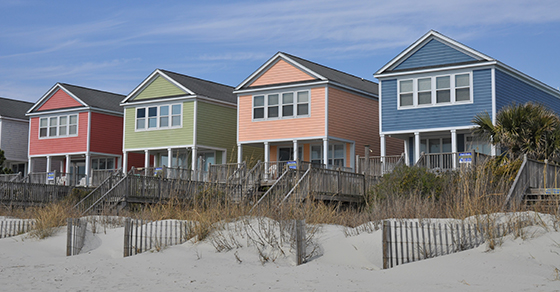Do you have dreams of buying a vacation beach home, lakefront cottage or ski chalet? Or perhaps you are fortunate enough to already own a vacation home. In either case, our team at Rudler has listed out different tax implications for renting it out for part of the year.

Count the days
The tax treatment depends on how many days it is rented and your level of personal use. Personal use includes vacation use by your relatives (even if you charge them market rate rent) and use by nonrelatives if a market rate rent is not charged.
If you rent the property out for less than 15 days during the year, it is not treated as “rental property” at all. In the right circumstances, this can produce significant tax benefits. Any rent you receive is not included in your income for tax purposes (no matter how substantial). On the other hand, you can only deduct property taxes and mortgage interest — no other operating costs and no depreciation. (Mortgage interest is deductible on your principal residence and one other home, subject to certain limits.)
If you rent the property out for more than 14 days, you must include the rent you receive in income. However, you can deduct part of your operating expenses and depreciation, subject to several rules. First, you must allocate your expenses between the personal use days and the rental days. For example, if the house is rented for 90 days and used personally for 30 days, then 75% of the use is rental (90 days out of 120 total days). You would allocate 75% of your maintenance, utilities, insurance, etc. costs to rental. You would allocate 75% of your depreciation allowance, interest and taxes for the property to rental as well. The personal use portion of taxes is separately deductible. The personal use portion of interest on a second home is also deductible if the personal use exceeds the greater of 14 days or 10% of the rental days. However, depreciation on the personal use portion is not allowed.
Income and expenses
If the rental income exceeds these allocable deductions, you report the rent and deductions to determine the amount of rental income to add to your other income. If the expenses exceed the income, you may be able to claim a rental loss. This depends on how many days you use the house personally.
Here is the test: if you use it personally for the greater of more than 14 days, or 10% of the rental days, you are using it “too much,” and you can not claim a loss. In this case, you can still use your deductions to wipe out rental income, but you can not go beyond that to create a loss. Any unused deductions are carried forward and may be usable in future years.
If you are limited to using deductions only up to the amount of rental income, you must use the deductions allocated to the rental portion in the following order:
- Interest and taxes,
- Operating costs, and
- Depreciation.
If you “pass” the personal use test (that is, you don’t use the property personally more than the greater of the figures listed above), you must still allocate your expenses between the personal and rental portions. In this case, however, if your rental deductions exceed rental income, you can claim a loss. (The loss is “passive,” however, and may be limited under the passive loss rules.)
Plan ahead for best results
The rules can be complex, so contact your Rudler, PSC advisor at 859-331-1717 if you have questions or would like to plan ahead to maximize deductions.
RUDLER, PSC CPAs and Business Advisors
This week's Rudler Review is presented by Brandon Hughes, Staff Accountant and Evan Kandra, CPA.
If you would like to discuss your particular situation, contact Brandon or Evan at 859-331-1717.


As part of Rudler, PSC's commitment to true proactive client partnerships, we have encouraged our professionals to specialize in their areas of interest, providing clients with specialized knowledge and strategic relationships. Be sure to receive future Rudler Reviews for advice from our experts, sign up today !